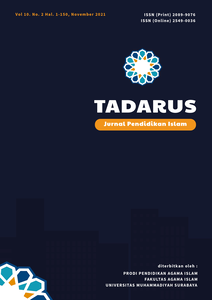Traffic Education In Contemporary Islamic Education Curriculum In Indonesia
DOI:
https://doi.org/10.30651/td.v7i2.2225Abstract
Abstract
Islamic studies that discuss the issue of traffic education in contemporary Islamic
education curriculum in Indonesia are necessary to be followed up more seriously. In
this context, the main purpose of this research is to find out what and how the
problems of traffic as well as traffic education in Indonesia? What is the urgency of
developing a traffic education curriculum in an Islamic perspective? This paper is
written using qualitative data which is based on references and literature on books,
news, journals and opinions in the mass media and other relevant sources in the study
of the development of the traffic education in contemporary Islamic education
curriculum in Indonesia. The results of the study show that: First, the problem of
traffic education in Indonesia is very complex. From day to day, we know that the
number of accidents has not yet dropped significantly.Even the highest accident rates
occur in the age of students and school children. Secondly, the development of a
traffic education curriculum in an Islamic perspective is very urgent given the many
problems caused by the many factors underlying traffic accidents. Muslims and
Islamic education institutions in this country should take a role of the awareness of
students and schoolchildren to carefully keep trying to realize, know and obey all
traffic rules for the safety and common good.
Keywords: Traffic Problems, Curriculum Development and Islamic Education
Downloads
Published
Issue
Section
License
Authors who publish with this journal agree to the following terms:
- Authors retain copyright and grant the journal right of first publication with the work simultaneously licensed under a Creative Commons Attribution-NonCommercial 4.0 International License that allows others to share the work with an acknowledgment of the work's authorship and initial publication in this journal.
- Authors are able to enter into separate, additional contractual arrangements for the non-exclusive distribution of the journal's published version of the work (e.g., post it to an institutional repository or publish it in a book), with an acknowledgment of its initial publication in this journal.
- Authors are permitted and encouraged to post their work online (e.g., in institutional repositories or on their website) prior to and during the submission process, as it can lead to productive exchanges, as well as earlier and greater citation of published workÂ




